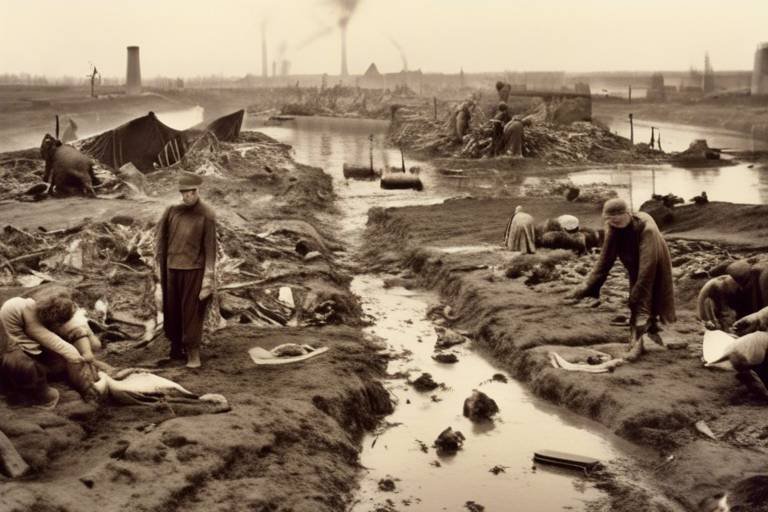The Role of Public Health in Historical Developments
Public health has always been a cornerstone of historical developments, influencing societies and shaping the course of events in profound ways. From ancient civilizations to modern times, public health initiatives have played a pivotal role in safeguarding the well-being of populations and driving progress.
Throughout history, the impact of public health measures has been evident in various key moments. The implementation of sanitation systems, disease surveillance, and vaccination programs has been instrumental in combating infectious diseases and improving overall public health outcomes.
During the Black Death in the 14th century, the devastating plague outbreak served as a catalyst for the rise of public health initiatives. The need to control the spread of infectious diseases and enhance sanitation practices led to the development of early public health measures aimed at protecting communities.
As the world underwent the Industrial Revolution, rapid urbanization and crowded living conditions posed significant public health challenges. In response, public health reforms were introduced to address issues such as poor sanitation, overcrowding, and disease transmission.
The Age of Exploration brought about new challenges as trade routes connected distant regions, facilitating the spread of diseases across continents. In response, public health interventions such as quarantine measures and disease surveillance were implemented to mitigate the impact of emerging health threats.
Wars have historically presented unique public health challenges, necessitating the establishment of field hospitals, disease prevention strategies, and mental health support for both military personnel and civilians. Public health efforts during times of conflict have been crucial in safeguarding the well-being of populations affected by war.
Advancements in public health have revolutionized healthcare systems worldwide, leading to significant improvements in disease prevention, health education, and access to medical services. The integration of public health principles into healthcare has enhanced the overall well-being of communities and contributed to the longevity of populations.
In response to global health crises such as pandemics, natural disasters, and humanitarian emergencies, public health efforts have been paramount in coordinating responses and mitigating the impact of these crises. Preparedness, coordination, and swift action have been key components of effective public health responses to global health challenges.
Public health policies have played a critical role in promoting socioeconomic development by addressing health disparities, improving living standards, and fostering a healthier population. The intersection of public health and socioeconomic factors has been instrumental in driving progress and creating more equitable societies.
Modern public health faces a new set of challenges, including antimicrobial resistance and the effects of climate change on health outcomes. Innovations in disease control, health promotion, and policy implementation are essential in addressing these emerging challenges and ensuring the continued success of public health initiatives.

The Black Death and the Rise of Public Health
Public health has played a crucial role in shaping historical events and societies. This article explores how public health initiatives have influenced significant developments throughout history.
The devastating impact of the Black Death in the 14th century led to the emergence of public health measures aimed at controlling infectious diseases and improving sanitation. As the plague ravaged Europe, communities were forced to confront the urgent need for organized public health interventions. Authorities implemented quarantine measures, established isolation hospitals, and focused on improving hygiene practices to prevent the spread of disease.
One of the most significant developments during this time was the recognition of the importance of public health in preventing widespread outbreaks. The Black Death served as a catalyst for the rise of public health as a formal discipline, marking a pivotal moment in history where societies began to prioritize the well-being of their populations through collective health initiatives.
Moreover, the Black Death highlighted the interconnected nature of public health and societal well-being. The outbreak underscored the impact of infectious diseases on economic stability, social structures, and overall quality of life. It prompted governments and communities to invest in public health infrastructure and policies to safeguard against future health crises.
1. What is the significance of public health in historical developments?
Public health has played a vital role in shaping societies by addressing health challenges, promoting well-being, and improving overall quality of life. Throughout history, public health initiatives have influenced major events and contributed to the advancement of civilizations.
2. How has public health evolved over time?
Public health has evolved from basic sanitation measures to comprehensive disease prevention strategies, health education programs, and healthcare reforms. Advances in public health have led to significant improvements in life expectancy, disease control, and population health outcomes.
3. What are the current challenges facing public health?
Modern public health faces challenges such as antimicrobial resistance, emerging infectious diseases, and environmental health threats. Addressing these challenges requires innovative approaches, collaboration across sectors, and a strong focus on prevention and preparedness.

The Industrial Revolution and Public Health Reforms
Public health has played a crucial role in shaping historical events and societies. This article explores how public health initiatives have influenced significant developments throughout history.
The Industrial Revolution marked a period of rapid industrial growth and urbanization, leading to overcrowded cities and unsanitary living conditions. As factories boomed and populations swelled, public health concerns became increasingly urgent. In response to the dire situation, public health reforms were introduced to address the pressing issues of sanitation, hygiene, and disease prevention.
Sanitation systems were established to improve living conditions and reduce the spread of infectious diseases. Proper waste disposal and clean water sources became priorities in urban planning to combat the rampant illnesses plaguing the population. Vaccination programs were also implemented to protect individuals from deadly diseases, contributing to a significant reduction in mortality rates.
The Industrial Revolution not only revolutionized the economy but also catalyzed advancements in public health. The recognition of the link between living conditions and health outcomes paved the way for policies that aimed to safeguard the well-being of the population. Public health reforms during this period laid the foundation for modern healthcare systems and set a precedent for future public health initiatives.
Q: How did the Industrial Revolution impact public health?
A: The Industrial Revolution led to overcrowded cities, poor sanitation, and increased disease prevalence, prompting the implementation of public health reforms to improve living conditions and combat infectious diseases.
Q: What were some key public health initiatives during the Industrial Revolution?
A: Sanitation systems, vaccination programs, and disease prevention strategies were key public health initiatives introduced during the Industrial Revolution to address the health challenges posed by rapid urbanization and industrialization.
Q: How did public health reforms during the Industrial Revolution influence modern healthcare?
A: Public health reforms during the Industrial Revolution laid the groundwork for modern healthcare systems by emphasizing the importance of sanitation, disease prevention, and access to healthcare services, shaping the way healthcare is delivered and managed today.

Public Health in the Age of Exploration
The Age of Exploration marked a significant period in history when European explorers ventured into unknown territories, encountering new cultures and diseases. As these explorers traveled to distant lands, they unintentionally introduced infectious diseases to native populations, causing devastating epidemics. Public health in this era focused on implementing quarantine measures and disease surveillance to prevent the spread of illnesses across continents. The exchange of goods and people during the Age of Exploration necessitated strict health regulations to protect both the explorers and the indigenous populations from the transmission of infectious diseases. Public health officials worked tirelessly to contain outbreaks and mitigate the impact of newly introduced pathogens, laying the foundation for future global health interventions.

Public Health in Times of War
During times of war, public health faces unique challenges as conflict zones often lead to widespread displacement, destruction of infrastructure, and increased risk of diseases. The impact of war on public health has been historically significant, with various strategies and innovations emerging to address the health needs of both military personnel and civilian populations.
One key development in public health during wartime is the establishment of field hospitals. These mobile medical units are crucial in providing immediate healthcare services to injured soldiers and civilians in conflict zones. Field hospitals not only treat physical injuries but also address infectious diseases, malnutrition, and mental health issues resulting from the trauma of war.
Moreover, disease prevention strategies play a vital role in mitigating health risks during wartime. Vaccination campaigns, sanitation programs, and health education initiatives are essential in preventing the spread of communicable diseases in crowded refugee camps and war-torn areas. By implementing these public health measures, authorities can reduce the impact of diseases on vulnerable populations.
Mental health support is another important aspect of public health in times of war. The psychological toll of conflict can lead to post-traumatic stress disorder (PTSD), anxiety, and depression among both combatants and civilians. Counseling services, trauma centers, and community-based mental health programs are crucial in addressing the mental health needs of individuals affected by war.
Furthermore, public health efforts in war zones focus on ensuring access to essential healthcare services. Humanitarian organizations and medical teams work tirelessly to provide medical supplies, emergency care, and surgical interventions to those affected by conflict. By establishing medical facilities and mobile clinics, public health professionals strive to reach populations in need and deliver life-saving interventions.
In conclusion, public health plays a crucial role in times of war by addressing the unique health challenges faced during conflicts. From field hospitals and disease prevention strategies to mental health support and healthcare access, public health initiatives are essential in safeguarding the well-being of individuals affected by war.

The Role of Public Health in Revolutionizing Healthcare
The evolution of public health has played a pivotal role in transforming healthcare systems globally. By focusing on disease prevention, health promotion, and community well-being, public health initiatives have revolutionized the way healthcare is delivered and managed.
One of the key aspects of public health in revolutionizing healthcare is the emphasis on preventive measures. Through vaccination programs, health education campaigns, and lifestyle interventions, public health has shifted the healthcare paradigm from treating illnesses to preventing them in the first place.
Furthermore, public health has been instrumental in improving access to medical services for underserved populations. By advocating for healthcare equity and implementing policies to address disparities, public health initiatives have made significant strides in ensuring that all individuals have access to quality healthcare.
In addition to preventive care and access to services, public health has also been at the forefront of healthcare innovations. From pioneering research in epidemiology to implementing data-driven approaches in healthcare delivery, public health professionals have continuously pushed the boundaries of what is possible in healthcare.
Moreover, public health has been crucial in shaping healthcare policies and regulations that govern the industry. By advocating for evidence-based practices, promoting ethical standards, and ensuring patient safety, public health has established a solid foundation for the healthcare sector to operate effectively and efficiently.
Overall, the role of public health in revolutionizing healthcare cannot be understated. Through its focus on prevention, access, innovation, and policy, public health has transformed the way healthcare is perceived, delivered, and experienced by individuals and communities worldwide.

Public Health Responses to Global Health Crises
Public health has played a crucial role in shaping historical events and societies. This article explores how public health initiatives have influenced significant developments throughout history.
The devastating impact of the Black Death in the 14th century led to the emergence of public health measures aimed at controlling infectious diseases and improving sanitation.
The rapid urbanization and poor living conditions during the Industrial Revolution spurred public health reforms, including the establishment of sanitation systems and vaccination programs.
Exploration and trade brought new diseases to different regions, prompting the need for public health interventions such as quarantine measures and disease surveillance.
Wars have historically posed significant public health challenges, leading to the development of field hospitals, disease prevention strategies, and mental health support for soldiers and civilians.
Advancements in public health have revolutionized healthcare systems worldwide, leading to improvements in disease prevention, health education, and access to medical services.
Public health efforts have been crucial in responding to global health crises such as pandemics, natural disasters, and humanitarian emergencies, highlighting the importance of preparedness and coordination.
Public health policies have been instrumental in promoting socioeconomic development by addressing health disparities, improving living standards, and fostering a healthier population.
Modern public health faces new challenges such as antimicrobial resistance and climate change, driving the need for innovative approaches in disease control, health promotion, and policy implementation.
Stay tuned for answers to common questions about public health and its impact on historical developments!

Public Health Policies and Socioeconomic Development
Public health has played a crucial role in shaping historical events and societies. This article explores how public health initiatives have influenced significant developments throughout history.
The devastating impact of the Black Death in the 14th century led to the emergence of public health measures aimed at controlling infectious diseases and improving sanitation.
The rapid urbanization and poor living conditions during the Industrial Revolution spurred public health reforms, including the establishment of sanitation systems and vaccination programs.
Exploration and trade brought new diseases to different regions, prompting the need for public health interventions such as quarantine measures and disease surveillance.
Wars have historically posed significant public health challenges, leading to the development of field hospitals, disease prevention strategies, and mental health support for soldiers and civilians.
Advancements in public health have revolutionized healthcare systems worldwide, leading to improvements in disease prevention, health education, and access to medical services.
Public health efforts have been crucial in responding to global health crises such as pandemics, natural disasters, and humanitarian emergencies, highlighting the importance of preparedness and coordination.
Public health policies have been instrumental in promoting socioeconomic development by addressing health disparities, improving living standards, and fostering a healthier population.
Modern public health faces new challenges such as antimicrobial resistance and climate change, driving the need for innovative approaches in disease control, health promotion, and policy implementation.

Challenges and Innovations in Modern Public Health
Public health has played a crucial role in shaping historical events and societies. This article explores how public health initiatives have influenced significant developments throughout history.
The devastating impact of the Black Death in the 14th century led to the emergence of public health measures aimed at controlling infectious diseases and improving sanitation.
The rapid urbanization and poor living conditions during the Industrial Revolution spurred public health reforms, including the establishment of sanitation systems and vaccination programs.
Exploration and trade brought new diseases to different regions, prompting the need for public health interventions such as quarantine measures and disease surveillance.
Wars have historically posed significant public health challenges, leading to the development of field hospitals, disease prevention strategies, and mental health support for soldiers and civilians.
Advancements in public health have revolutionized healthcare systems worldwide, leading to improvements in disease prevention, health education, and access to medical services.
Public health efforts have been crucial in responding to global health crises such as pandemics, natural disasters, and humanitarian emergencies, highlighting the importance of preparedness and coordination.
Public health policies have been instrumental in promoting socioeconomic development by addressing health disparities, improving living standards, and fostering a healthier population.
Modern public health faces new challenges such as antimicrobial resistance and climate change, driving the need for innovative approaches in disease control, health promotion, and policy implementation.
Stay tuned for answers to common questions about public health in our upcoming FAQ section!
Frequently Asked Questions
- What is the significance of public health in historical developments?
Public health has played a crucial role in shaping historical events and societies by implementing measures to control diseases, improve sanitation, and revolutionize healthcare systems.
- How did the Black Death impact the rise of public health?
The devastating impact of the Black Death in the 14th century led to the emergence of public health measures aimed at controlling infectious diseases and improving sanitation to prevent future outbreaks.
- What role did public health play during the Industrial Revolution?
During the Industrial Revolution, public health reforms were introduced to address rapid urbanization and poor living conditions, leading to the establishment of sanitation systems and vaccination programs to improve public health.
- How has public health responded to global health crises?
Public health efforts have been crucial in responding to global health crises such as pandemics, natural disasters, and humanitarian emergencies by emphasizing preparedness, coordination, and implementing effective public health interventions.
- What are the challenges faced by modern public health?
Modern public health faces new challenges such as antimicrobial resistance and climate change, driving the need for innovative approaches in disease control, health promotion, and policy implementation to address evolving public health threats.



















